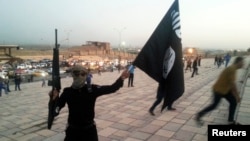As Iraq's Sunni militants and their allies add border crossings near Syria and Jordan to their list of captured territory, many observers wonder what’s next. U.S. officials have warned that the militants, from the Islamic State of Iraq and Levant (ISIL), could spread into Jordan, while some see them moving toward the Iraqi capital. Some analysts say ISIL's strategy is just part of the group's greater agenda of erasing modern borders and building a caliphate across the whole region.
The takeover of the Traibil border post with Jordan and the Al-Wajeed entry point to Syria were part of the ISIL’s primary agenda of creating a cross-border state, according to Brian Fishman, a counterterrorism research fellow at the New America Foundation.
"ISIL does not want to take over Iraq as it is currently constructed. In fact, I think that ISIL is probably going to be perfectly content not to try its hardest to take over Baghdad. I think what ISIL is looking to do is create a jihadi state in the primarily Sunni areas of western and northern Iraq and into eastern Syria," says Fishman.
Fishman says the way the militants will carry out their strategy can be seen from how they operated in Syria. ISIL is fighting in the country’s civil war and has taken control of towns along Syria’s eastern border.
"This is not a group that has tried to go on the offense against Damascus. This is not a group that is trying to dominate every square inch of Syria. And they’re going to do the same thing in Iraq. They’re going to say: What can we control? Where can we dominate? Where can we establish governance? And, where can we establish a base of operations for the long term?" – says Fishman.
Success through alliances
Part of ISIL’s success, according to Fishman, lies in its ability to form alliances with local Sunni militias, tribal groups and other organizations, one of the most surprising being the Naqshbandi army, a group closely associated with the remnants of the Iraqi Baath party of Saddam Hussein’s old regime.
"This is not a natural alliance. Jihadis and the old Iraqi Baath party don’t like each other. They have very, very different ideologies, very different ideas of who should be in charge and what the rules for society ought to be. And yet they’ve been able to cooperate, it seems in recent days, for this military offensive," says Fishman.
He says the best way to attack ISIL is not through military actions but by breaking the political alliances that have given it strength.
"It was losing those alliances originally that weakened the group in 2007 and it is regaining them; that has given it renewed strength today," says Fishman.
U.S. officials are urging Iraqi Prime Minister Nouri al-Maliki to form a new, inclusive government that will encourage the country’s Sunni population to re-assess and potentially break their allegiances with the militant group.
U.S. Republican Senator Lindsey Graham said these new alliances could potentially affect military efforts in the country.
"So there's a window of opportunity here, I think, to get the Sunnis to re-assess. If you could find a new government that they felt hopeful about, I think we could form an alliance politically and militarily that would affect the momentum on the ground," says Graham.
Maliki has rejected the calls, saying any new government that ignores the results of the country's April election would be a “coup against the constitution and the political process.”
U.S. Secretary of State John Kerry said during a recent visit to Iraq that support from the U.S., which is sending 300 military advisers, will be intense, sustained, and effective if Iraq's leaders take the necessary steps to bring the country together.
Iraqi Militants Make Gains Aided by Local Tribal Support
- By Amanda Scott

